Welcome to CBM Papua New Guinea
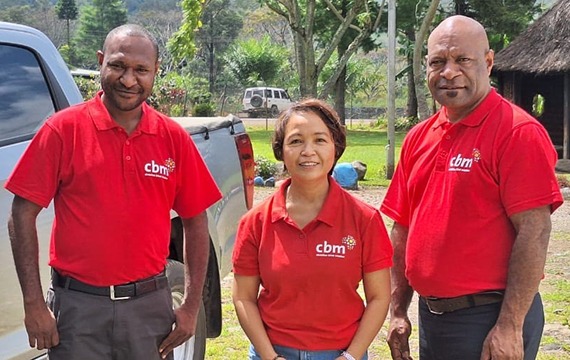 With a population of over 10 million people, Papua New Guinea is the largest and most populous nation in the Pacific Islands. Ranked 155 on the UN Human Development Index (HDI), the people of Papua New Guinea experience high levels of poverty. Mountainous terrain and limited infrastructure connecting the communities means that the majority face difficulty accessing health and education services.
With a population of over 10 million people, Papua New Guinea is the largest and most populous nation in the Pacific Islands. Ranked 155 on the UN Human Development Index (HDI), the people of Papua New Guinea experience high levels of poverty. Mountainous terrain and limited infrastructure connecting the communities means that the majority face difficulty accessing health and education services.
CBM began working in Papua New Guinea (PNG) in 1978, supporting partners and working with local government and non-government stakeholders to implement development programmes. For over 10 years, this has been in partnership with the New Zealand Government Aid Programme.
In 2023, CBM New Zealand registered in Papua New Guinea as Christian Blind Mission PNG Inc an entity under the Investment Promotion (IPA) Act (1992). Our registration number is: (5-109409).
CBM PNG working areas are Inclusive Eye Health and Community Based Inclusive Development (including Inclusive Education and Community Based Rehabilitation).
Eye Health
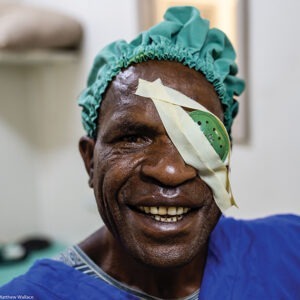 A recent study found that 5.6% of the population in Papua New Guinea aged 50 years and over experience visual impairment from un-operated cataract or blurred vision. Equipment and infrastructure for eye health services are limited and many people remain untreated or receive treatment late.
A recent study found that 5.6% of the population in Papua New Guinea aged 50 years and over experience visual impairment from un-operated cataract or blurred vision. Equipment and infrastructure for eye health services are limited and many people remain untreated or receive treatment late.
Very few health personnel in Papua New Guinea are qualified to provide assessment and treatment of eye conditions. There are only 14 national ophthalmologists practicing in Papua New Guinea, far below the 80 required to attain the recommended ratio for the population of almost 9 million people. Around 40% of the population are aged 0-15 years, however there are no national ophthalmologists with paediatric specialisation to meet their needs.
In general there is a lack of awareness that intervention to address visual impairment is possible. Because of these barriers, children and adults who are blind or have visual impairment can experience social challenges that put them at risk of abuse and neglect.
CBM’s work includes:
- Sight-saving surgeries in rural communities.
- Restoring sight by helping to fund spectacles and low vision devices.
- Eye-care clinics in marginalised communities.
- Training of local ophthalmologists.
- Preventing avoidable blindness with eye care screening and awareness-raising in remote communities.
- Supporting representative organisations of persons with visual impairment to promote their rights and social inclusion.
Inclusive Education
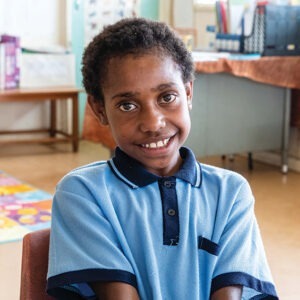 In Papua New Guinea, children with disabilities are significantly under-represented in school. Estimates show that 90% of children with moderate to severe disabilities are not attending school. Without access to effective education, children with disabilities are missing the opportunity to reach their potential and are often among the poorest and dependent on others for support.
In Papua New Guinea, children with disabilities are significantly under-represented in school. Estimates show that 90% of children with moderate to severe disabilities are not attending school. Without access to effective education, children with disabilities are missing the opportunity to reach their potential and are often among the poorest and dependent on others for support.
The Government of Papua New Guinea was one of the first countries worldwide to adopt disability-inclusive education within national policy. However, a chronic lack of resources to implement the policy means that the needs of children with disabilities are not sufficiently met in school. With over 130,000 children with disability missing out on school, this project aims to increase enrolment and attendance by improving infrastructure of selected schools, increasing the effectiveness of teaching and providing accessible educational resources.
CBM’s work includes:
- Supporting children with visual, hearing, physical or intellectual disabilities access education through schools or informal education in the community.
- Training teachers to meet the individual educational needs of children with disabilities.
- Making accessibility improvements to school grounds and bathrooms.
- Resource specialised units at schools to teach skills such as sign language, braille, orientation and mobility.
- Supporting model schools to develop action plans toward best practice of inclusive education.
- Providing awareness raising at schools and with parents to promote inclusive communities.
Community Based Rehabilitation
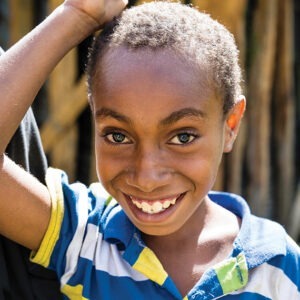 Around 2 million people are estimated to have a disability in Papua New Guinea – one in every five people. Despite Government support for disability rights, people with disabilities are often unable to access health care, participate in community life, or go to school or work because of negative stigma, a lack of accessibility and other barriers. Sadly, people with disabilities often remain dependent on others for support, unable to escape a life of scarcity and deprivation.
Around 2 million people are estimated to have a disability in Papua New Guinea – one in every five people. Despite Government support for disability rights, people with disabilities are often unable to access health care, participate in community life, or go to school or work because of negative stigma, a lack of accessibility and other barriers. Sadly, people with disabilities often remain dependent on others for support, unable to escape a life of scarcity and deprivation.
Medical, rehabilitation services and assistive devices are essential if children and adults with disabilities are to have the opportunity to attain their aspirations and reach their potential. Without this support, people with disabilities are at high risk of living in isolation, neglect or unnecessary dependency on others for support.
CBM’s work includes:
- Organising community outreach clinics to identify children with disabilities early in life to support developmental milestones.
- Providing rehabilitation services such as assessment, therapies and referrals for specialised orthopaedic, hearing or other essential services.
- Empowering children and adults with disabilities with therapies to reach individual goals so they can participate in family and community life.
- Providing postural and mobility assistive devices such as crutches, standing frames, parallel bars, portable toilets, corner chairs and communication boards for ongoing rehabilitation in rural communities.
- Supporting local organisations of persons with disabilities to amplify the voice of clients and parents groups at the national level through the National Board for Disabled Persons in PNG.
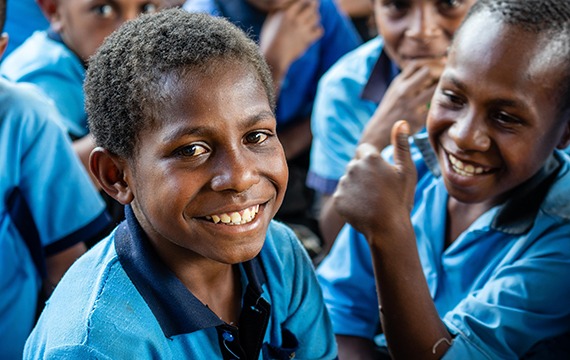
Our team would love to hear from you
Complaints
CBM PNG is committed to a culture of integrity, transparency and accountability.
CBM PNG was established by CBM New Zealand and complaints about CBM PNG are handled through CBM New Zealand. If you have any concerns or complaints you wish to raise about CBM PNG, its partners or working practices, please feel free to contact us using one of the following options:
Email: complaints@cbmnz.org.nz
Mail to:
CBM New Zealand
PO Box 303477
North Harbour, Auckland 0751
NEW ZEALAND
Attention: CEO
Call: +64 9 414 9405 and ask for the CEO.
Or you can request a confidential interview with a senior CBM PNG or CBM New Zealand staff member who will document the complaint and forward it immediately to the CBM New Zealand CEO.
For accessibility, alternative formats can be requested for disseminating information about the complaints process and arrangements for recording a complaint.
Whistleblowing:
Whistleblowing, and whistleblower protections, create an important pathway for both external community and internal workplace participant reporting of concerns and suspicion of illegal or dishonest activity relating to CBM PNG’s work.
CBM PNG requires the reporting of conduct that a person has reasonable grounds to suspect is misconduct, wrongdoing, or an improper state of affairs, relating to CBM PNG, its partners or any related entities.
If you have not received satisfactory responses through the channels above, or should you have reasonable grounds to believe you should report outside of the management of CBM PNG or CBM New Zealand, you may write to the CBM PNG New Zealand Board Chair at board@cbmnz.org.nz, or to CBM Global on whistleblowing@cbm-global.org.